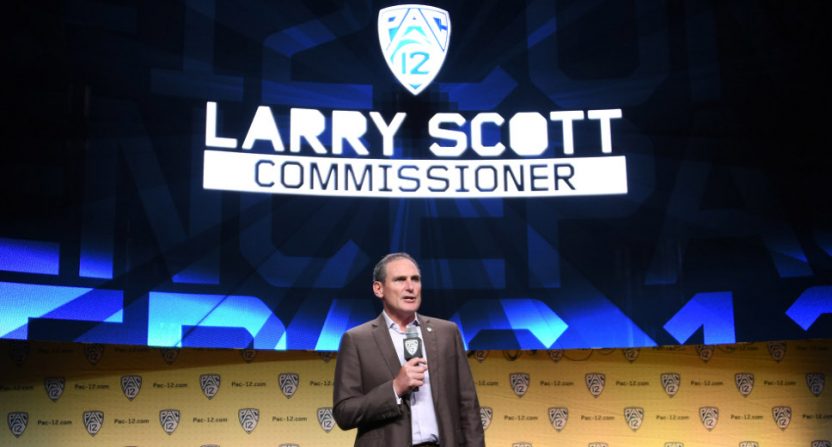It’s a time of some uncertainty for conference networks, with even the well-established Big Ten Network in a carriage dispute with Comcast. The Pac-12 Networks remain in a much more tenuous situation, as they’re coming up on their sixth anniversary in August and still don’t have a DirecTV deal (but hey, you can see them in China!), despite optimism from new networks president Mark Shuken (who used to work at DirecTV/Root Sports). They also have seen their average per-subscriber carriage fee drop a reported 63 percent since 2012 to $0.11, joining beIN Sports, the Olympic Channel and the Tennis Channel as the only networks in the 24 considered to see a decline from 2012-2017.
And now, not only does there appear to be no progress on the DirecTV front, they might also face some issues with AT&T U-Verse. First, the DirecTV news, as per Jon Wilner of the San Jose Mercury-News:
PAC-12 commissioner Larry Scott says "not expecting" change in DTV situation.
— Jon Wilner (@wilnerhotline) July 25, 2018
Wilner, who’s been the leading reporter on this situation for years, wrote Monday that the conference’s contracts with DirecTV owner AT&T and their U-Verse cable offering also expire this summer, and that many sources think those won’t be renewed:
In the late summer of 2013, the Pac-12 announced a sweeping partnership with AT&T that included marketing rights to Pac-12 events, telecom services for the conference and U-verse distribution for the Pac-12 Networks.
…The terms of the AT&T deal were not released. But according to a timeframe laid out two years ago by commissioner Larry Scott, the contract expires this summer — every facet of it.
…“I guess you never know, but my assumption is that they’re each going their own way,’’ one source said.
Another source explained that the conference and AT&T have been destined for separation since Sept. ’15, the last time they seriously engaged in negotiations over DirecTV carriage.
That piece adds that the AT&T talks have been on rough ground since September 2015, where AT&T made an offer to the conference that included DirecTV carriage in return for wireless rights on Pac-12 campuses. Scott recommended that deal to the school presidents, but they shot it down 11-0 (with Washington State abstaining). And a source told Wilner “When that went down is when it all started unraveling…Can they repair it? I don’t know.” So that’s certainly not optimistic.
However, while losing U-Verse would be another blow, it isn’t necessarily the world’s biggest deal. U-Verse only has an estimated four million subscribers, with less than half of those inside the Pac-12’s footprint (where the conference gets a better per-subscriber fee). And Wilner notes that the current AT&T deal includes wireless sponsorship across the contract, and if that went away, the California schools in particular might be able to negotiate better wireless deals on their own that would more than make up for the loss of U-Verse. That would hurt the smaller schools, though, and while it might work out okay for some schools, it certainly wouldn’t be great for the network as a whole. And beyond just the loss of U-Verse in its own right, that loss would presumably indicate there really will never be a DirecTV deal any time soon.
It’s also notable that the Pac-12 networks’ carriage issues have become such a talking point that they’re even a plot point in this year’s season of Ballers, which includes a plan to merge the Pac-12 Networks with a surfing channel to boost its distribution. That specific solution probably isn’t going to happen, but it is significant that part of the Pac-12 Networks’ problems have come from their lack of partnership with a bigger media organization; unlike the Big Ten Network (51 percent owned by Fox), the SEC Network (80 percent owned by Disney/ESPN, 20 percent owned by Hearst) and even the forthcoming ACC Network (same ownership structure as the SEC Network), the Pac-12 doesn’t have any corporate sibling channels to use as leverage in carriage negotiations.
And the networks don’t have compelling-enough content for many carriers to be that worried about them, as DirecTV in particular has done just fine without the lower-tier Pac-12 games that wind up on the networks. So maybe a path forward is finding a network or distributor partner to take an equity interest in the networks, or finding a way to put more compelling content on them (that’s limited by the linear Tier One TV deals with ESPN and Fox, though, which run through the 2023-24 school year). But there’s no particularly easy or obvious solution here, and the state of the networks may not improve much in the near future. Fixing their issues might even be too much of a challenge for The Rock.






